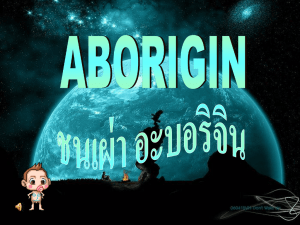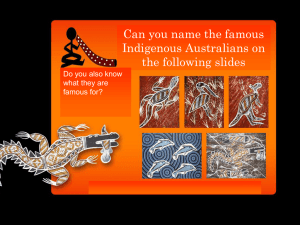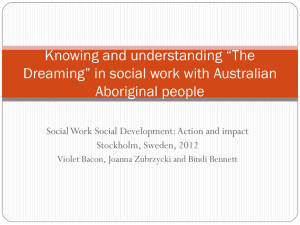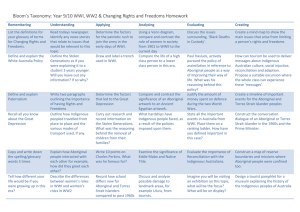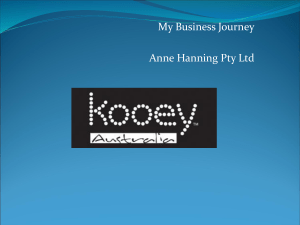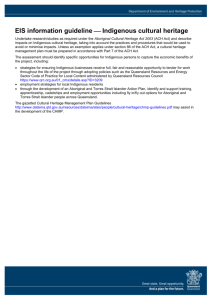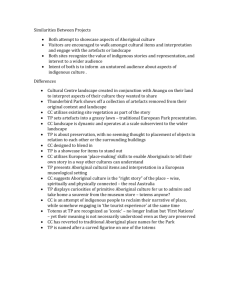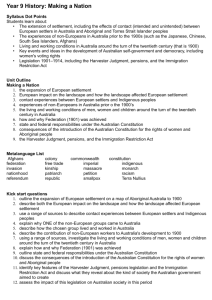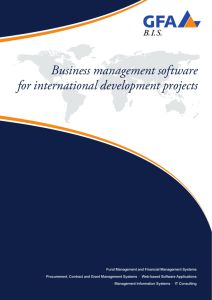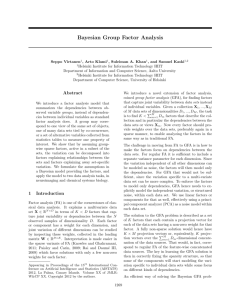here. - School of History
advertisement
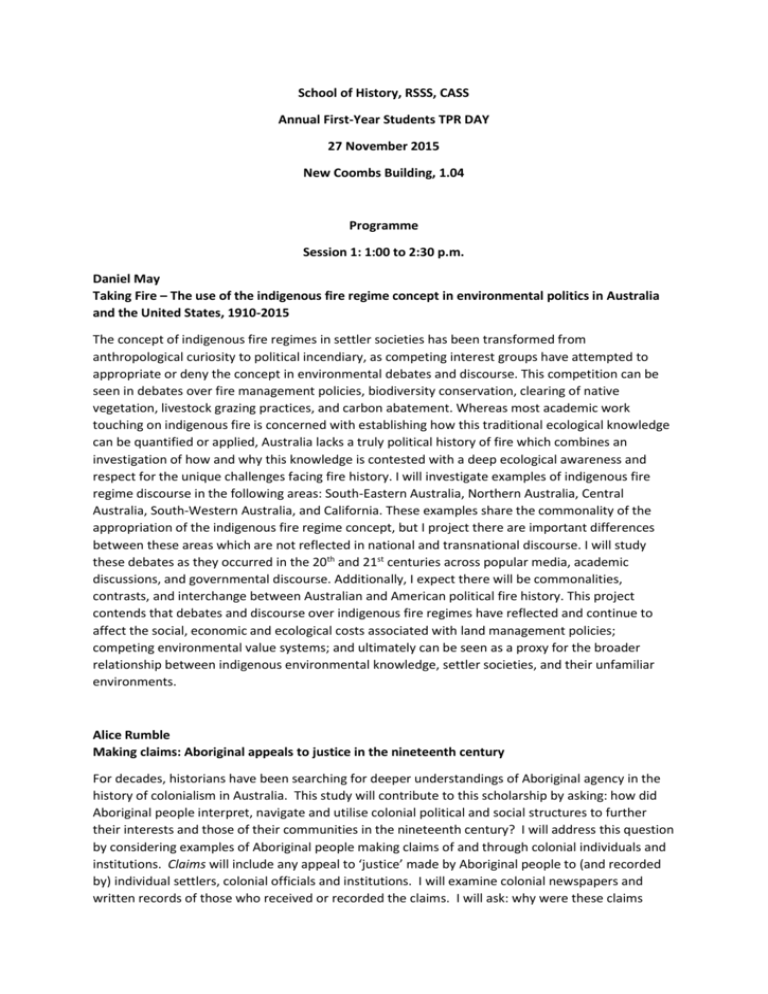
School of History, RSSS, CASS Annual First-Year Students TPR DAY 27 November 2015 New Coombs Building, 1.04 Programme Session 1: 1:00 to 2:30 p.m. Daniel May Taking Fire – The use of the indigenous fire regime concept in environmental politics in Australia and the United States, 1910-2015 The concept of indigenous fire regimes in settler societies has been transformed from anthropological curiosity to political incendiary, as competing interest groups have attempted to appropriate or deny the concept in environmental debates and discourse. This competition can be seen in debates over fire management policies, biodiversity conservation, clearing of native vegetation, livestock grazing practices, and carbon abatement. Whereas most academic work touching on indigenous fire is concerned with establishing how this traditional ecological knowledge can be quantified or applied, Australia lacks a truly political history of fire which combines an investigation of how and why this knowledge is contested with a deep ecological awareness and respect for the unique challenges facing fire history. I will investigate examples of indigenous fire regime discourse in the following areas: South-Eastern Australia, Northern Australia, Central Australia, South-Western Australia, and California. These examples share the commonality of the appropriation of the indigenous fire regime concept, but I project there are important differences between these areas which are not reflected in national and transnational discourse. I will study these debates as they occurred in the 20th and 21st centuries across popular media, academic discussions, and governmental discourse. Additionally, I expect there will be commonalities, contrasts, and interchange between Australian and American political fire history. This project contends that debates and discourse over indigenous fire regimes have reflected and continue to affect the social, economic and ecological costs associated with land management policies; competing environmental value systems; and ultimately can be seen as a proxy for the broader relationship between indigenous environmental knowledge, settler societies, and their unfamiliar environments. Alice Rumble Making claims: Aboriginal appeals to justice in the nineteenth century For decades, historians have been searching for deeper understandings of Aboriginal agency in the history of colonialism in Australia. This study will contribute to this scholarship by asking: how did Aboriginal people interpret, navigate and utilise colonial political and social structures to further their interests and those of their communities in the nineteenth century? I will address this question by considering examples of Aboriginal people making claims of and through colonial individuals and institutions. Claims will include any appeal to ‘justice’ made by Aboriginal people to (and recorded by) individual settlers, colonial officials and institutions. I will examine colonial newspapers and written records of those who received or recorded the claims. I will ask: why were these claims made? What notions of ‘justice’ were invoked? What can these appeals reveal about the key concerns of the Aboriginal claimants in each case? In answering these questions I will examine the language of the claim, its broader context and how it was communicated and recorded. This approach will be guided by scholarship on indigenous petitioning, indigenous letter writing and community specific anthropological works providing insights into Aboriginal legal, political and cultural systems informing the claims. My case studies will be drawn from regions where settler expansion triggered political encounters in South Australia, Western Australia and Queensland in the 1840s and 1890s. In comparison to Victoria, NSW and Tasmania, these colonies have been neglected in studies of political engagement between Aboriginal people and settlers. This study will contribute to existing scholarship through this new geographic focus and by drawing together claims made to disparate recipients (e.g. protectors, missionaries and courts) to consider the claims in their own right. I hope this new approach will highlight the changing political strategies and concerns of Aboriginal claimants in these regions in a range of different contexts. Nicholas Hoare (Re)Mining Makatea: making histories out of Pacific phosphate. Perched bolt up-right, all-cliffs, imposing and austere, Makatea is a curious outlier. As a raised coral atoll in a surrounding Oceanic sea-scape of seventy-seven mostly low-lying atolls making up the Tuamotu Archipelago in French Polynesia, Makatea is a geographic and geological oddity, matched only, I contend, by its unique anthropogenic history. More curious still is the view from above, where a pock-marked surface more than hints at a legacy of over half a century (1908-1966) of industrialscale mining that involved roughly eleven million tonnes of phosphate rock to be dug up, shipped out and eventually scattered over agricultural fields in different parts of the globe. Where exactly did this extracted Polynesian land end up? And for what reasons? To whom did the hands that toiled on the diggings belong? And why did they come to the island? Who reaped the benefits? And who were the losers? Moreover, for an island so highly prized by interested parties throughout the mining years, why has it largely flown beneath the radar of historians ever since? In this paper I propose that these research questions can be best answered by using a number of different methodological approaches along with an enlarged archive of written, oral and visual sources. By assembling a series of separate, semi self-contained “histories”—environmental, indigenous, business, labour, war, visual, and contemporary—I aim to create a bricolage-styled “history” that is at once global in scale yet local in focus; playfully reflective and kaleidoscopic in form yet deep and empirical in content. It is my contention that this multi-faceted approach better captures the fractured pasts and presents of both the island and the peoples who made, and are continuing to make, history upon it. TEA BREAK: 2:30 to 3:00 Session 2: 3:00 to 4:00 Eamonn McNamara “A peace of sorts”: Changing expectations in Northern Ireland after the Belfast Agreement, 19982007. The 1998 Belfast or Good Friday Agreement (GFA) ended ‘the Troubles’ in Northern Ireland (19681998) and espoused both ‘peace’ between paramilitaries and security forces, and ‘reconciliation’ between Catholics and Protestants. After thirty years of conflict, the expectation that the GFA would foster peace and reconciliation was understandably high. This thesis asks – how did expectations reflected in, generated by, and legitimated through the GFA shift when acts of violence occurred after the Agreement? What can responses to these violent acts tell us about shifting expectations of the GFA in Northern Ireland? In what ways does a formal, symbolic agreement, such as the GFA acquire its power and relate to the management of endemic conflict in society? I focus on three incidents of violence – the Omagh Bombing (1998), Holy Cross dispute (2001), and murder of Robert McCartney (2005). These events stimulated the public, journalists and politicians to reflect publicly on their changing expectations of the GFA. I treat these groups’ reactions to specific incidents as case studies to explore how the GFA framed responses to violence, while managing a public agenda of reconciliation in response to new challenges. I use journalistic and political responses to violent incidents to trace the nature of concerns over obstacles to ‘peace’. I examine autobiographies of people directly affected by violence, which challenged the official ‘peace process’ narrative. Whereas most scholarship on the GFA’s cultural impact has assessed ‘public opinion’ through opinion polls, I contend that public responses to violent incidents more clearly reveal the changing expectations of journalists, politicians and the wider public. I argue that these responses challenged the terms of debates surrounding the GFA, while reflecting its new paradigms. This study will contribute to a better understanding of how symbolic and formal politics influenced the deeper political culture of Northern Ireland after the GFA. Catherine Horne Modern Voices: Women’s Speech on Australian Radio, 1923-1966 This project will investigate women’s speech on Australian radio during its mid-twentieth century ‘golden age’ through a focus on specific women, including actors, announcers, social activists and politicians, and the programmes on which they were heard. Although historians of Australian speech, radio, and modern womanhood have so far largely neglected this topic, a small number of scholars in the United States, Western Europe and South America have examined the connection between women’s radio speech and public citizenship. This study will test the conclusions reached by these international scholars through a focus on the distinctiveness of the Australian experience. Compared with other regions, Australia had a different radio industry, particular experiences of women’s enfranchisement and political participation, and characteristic debates about speech. This thesis will also contribute to the history of Australian radio by providing the first comprehensive study of women’s radio speech in this country. How did radio change women’s experiences of speaking as well as attitudes to their voices over this period? Why did women’s radio speech become a focus of broader debates over modern femininity and women’s public citizenship in Australia? These questions form the basis of my research, and to answer them I am developing a methodology based on the social semiotics of sound. This approach will be used to investigate the sonic and lexical qualities of women’s speech on surviving broadcast programmes, and this is another key contribution of my work. Scripts, programme correspondence, and radio magazines will also be examined to reveal what topics, vocabularies and vocal performance styles were expected of and adopted by women on the air, and how producers and listeners evaluated women’s voices. My hypothesis is that radio enabled the development of particular forms of modern public womanhood defined by speech and sound. Wine and Cheese reception: 4:00 to 5:00
